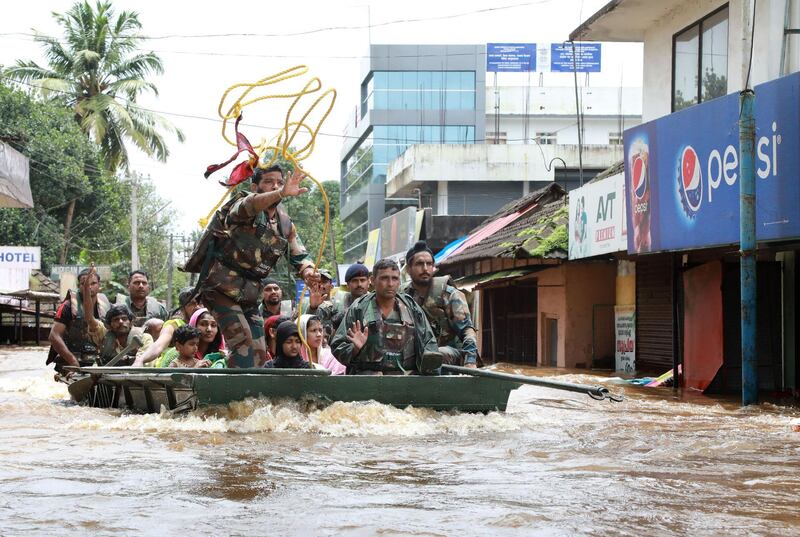It is a powerful image that has reverberated around the world: a bereft mother sobs as she clutches a baby to her chest after Kerala's worst floods in a century, grief writ large across her face. It is all the more poignant knowing the same scene of devastation has been replicated thousands of times over in India's 13th most populous state, brought to its knees after heavy rains and fast-rising rivers flooded nearly all its districts. More than 350 people have died and more than 800,000 displaced in the unprecedented catastrophe.
Thousands of terrified people are still stranded on rooftops, many without food and water. Some cynical shopkeepers have exploited the emergency by bumping up the price of basic supplies, causing protests and police intervention in some districts.
Meanwhile more than 5,600 relief camps are providing temporary refuge as those taking shelter contemplate the possibility of returning to destroyed homes, having lost everything. Nor is the worst over, with warnings of worse weather to come.
Few can fail to be moved by the plight of those who have lost loved ones and whose lives and possessions have been wrecked. But the devastating floods in Kerala have a particular resonance in the UAE, where three million Indians live and work, the majority from the southwestern state.
Their hard work and dedication have been integral to the growth of this country. Many Keralites based here will be waiting anxiously for news of the missing or displaced, unable to trace them while communication lines are down.
Across the Gulf, up to 80 per cent of Indian migrants hail from the state. It is critical in the coming weeks that support is offered to all those who are affected, whether that amounts to financial aid, donations of clothing and supplies or simply a listening ear for the grief-stricken. On a global scale, the flood-hit state will require a concerted international response to repair damage amounting to $2.7 billion.
The UAE, the world’s biggest donor relative to income, was quick to respond to the clarion call. President Sheikh Khalifa was expeditious in forming an emergency committee to make aid arrangements. That reflects the spirit of giving that underscores Eid Al Adha, a time to think of those less fortunate, as well as the longstanding ties between India and the UAE.
Numerous officials and politicians across India have also pledged to donate portions of their salary to Kerala. It is vital this momentum is not lost in the coming weeks when the news cycle changes but the needs of Keralites remain equally pressing.
There will no doubt be queries over the coming weeks about whether anything could have been done to better prepare for such a disaster. Searing questions will be asked about why flood risk warnings dating back to 2011 were not heeded and acted upon. But for now, it is vital everything is done to help restore the dignity of Keralites who have lost everything.





